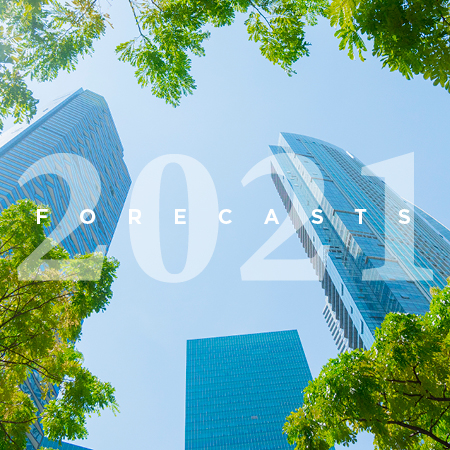On the assumption that a widely available vaccine will be distributed in 2021, there is now hope for a brighter future in the Asia-Pacific region. We expect to see softened containment measures and fewer border restrictions, and a return in cross-border property investment. In the near term, low interest rates are likely to persist and will continue to support real estate, while substantial unallocated funds in the region suggest that deal making will be competitive.
Vietnam is one of three markets (including China and Taiwan) which is expected to record positive GDP growth in 2020. Effective containment of Covid-19 and the ratified EU-Vietnam Free Trade Agreement has reassured manufacturing and logistics investors. The US-China trade tensions have also added to the appeal of the country as a manufacturing base, as it has done in Taiwan.
Singapore investment activity is expected to pick up as more workers return to offices and investors have a better idea of the future spatial needs of office users, giving them greater confidence to underwrite an investment.
In India, demand for and supply of quality Grade A office space and residential premises is recovering swiftly. Private equity and institutional investors have largely remained confident about the investment opportunities in the country given the rapid pace of urbanisation. The launch of a REIT market has improved market transparency and laid the foundation for the sector’s resilience.
China is projected to experience a strong recovery and could account for over one third of the world’s economic growth in 2021. Consumption has recovered from the pandemic hit, and the retail market has resumed to some extent, with improved physical turnover in shopping malls nationwide. Domestic consumption, technology, R&D expenditure in strategic sectors, 5G and the opening up of financial markets will be the key drivers of a sustainable economy in China. Firm consumer demand and domestic tourism will provide support to the retail and hospitality sectors in 2021.
In Japan, corporates have increasingly turned to property disposals in an effort to offset the economic damage from the pandemic. Within the residential sector specifically, investors chasing higher yields seem to have broadened their focus towards more niche sectors such as student housing and elderly care facilities.
2021 Asia-Pacific tips

- Grade A offices in regional cities, including Seoul, Singapore, Sydney, Taipei and Ho Chi Minh City, with long weighted average lease expiries and secure tenant covenants.
- Prime industrial property in Australia (warehouse and storage facilities) which service densely populated areas.
- Multifamily sector in Japan continues to be a defensive play, acting as a ballast to investor portfolios.

- Logistics assets in South Korea, Mainland China (coastal regions and particularly Greater Bay Area, Yangtze River Delta and Beijing-Tianjin-Hebei regions) and Taiwan, as the e-commerce, online grocery market and technology sectors are expanding rapidly.
- Retail space in leading Chinese cities (e.g. Shanghai and Shenzhen), e.g. small-scale community retail centres targeting local communities with stable tenant and higher yields.
- The multifamily sector in Yokohama is an attractive alternative to the pricier districts of Tokyo. Larger developments, including the possibility of an integrated resort, may bring further vibrancy to the area.
- Grade A and Grade B offices in Ho Chi Minh City as occupancy has remained stable during the pandemic. Overseas tenants, particularly foreign direct investment enterprises, are interested in securing quality office space to enter Vietnam as an operational base.
- The office market in Hyderabad, India, which has received substantial government support by way of investor friendly policies and infrastructure development. It is emerging as a key commercial market and one of the top tech destinations in India.
- Distressed retail assets in Hong Kong, as the government is abolishing the double stamp duty for commercial property to soften the decline in capital values.
- Distressed hospitality assets for renovation or conversion to generate attractive yields and capital growth.
- Data centres driven by the expansion of the digital economy, growing use of cloud services and the 5G mobile data network, particularly in China and Australia.







